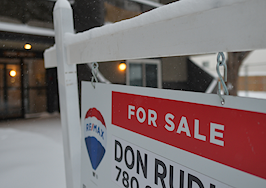Mortgage rates have come down from their June highs, but demand for home loans remains at the lowest level in more than 20 years, according to a weekly survey by the Mortgage Bankers Association.
The MBA’s Weekly Mortgage Applications Survey showed demand for purchase loans was down a seasonally adjusted 1 percent last week when compared to the week before, and 18 percent from a year ago.
Requests to refinance were down 5 percent week over week and 82 percent from a year ago, to the lowest level since November, 2000.

Joel Kan
“Home purchase applications continued to be held down by rapidly drying up demand, as high mortgage rates, challenging affordability, and a gloomier outlook of the economy kept buyers on the sidelines,” MBA forecaster Joel Kan said in a statement. “However, if home price growth slows more significantly and mortgage rates move lower, we might see some purchase activity return later in the year.”
The MBA survey showed rates on 30-year fixed-rate mortgages have come down half a percentage point from their June high, but are still two percentage points higher than a year ago.
Mortgage rates ease
The Optimal Blue Mortgage Market Indices also show rates for 30-year fixed-rate loans have eased from a 2022 high of 6.06 percent registered June 14.
The MBA reported average rates for the following types of loans for the week ending Aug. 12:
- For 30-year fixed-rate conforming mortgages (loan balances of $647,200 or less), rates averaged 5.45 percent, down from 5.47 percent the week before. With points decreasing to 0.57 from 0.80 (including the origination fee) for 80 percent loan-to-value ratio (LTV) loans, the effective rate decreased.
- Rates for 30-year fixed-rate jumbo mortgages (loan balances greater than $647,200) averaged 5.14 percent, up from 5.09 percent the week before. But with points decreasing to 0.33 from 0.59 (including the origination fee) for 80 percent LTV loans, the effective rate decreased.
- For 30-year fixed-rate FHA mortgages, rates averaged 5.38 percent, up from 5.35 percent the week before. Although points decreased slightly, to 1.01 from 1.02 (including the origination fee) for 80 percent LTV loans, the effective rate increased.
- Rates for 15-year fixed-rate mortgages, popular with homebuyers who are refinancing, averaged 4.87 percent, up from 4.74 percent the week before. With points increasing to 0.64 from 0.62 (including the origination fee) for 80 percent LTV loans, the effective rate also increased.
- For 5/1 adjustable-rate mortgages (ARMs), rates averaged 4.43 percent, down from 4.60 percent the week before. With points also decreasing to 0.43 from 0.63 (including the origination fee) for 80 percent LTV loans, the effective rate decreased from last week.
Where mortgage rates are headed next depends largely on whether Federal Reserve policymakers see signs that their attempts to fight inflation by tightening monetary policy are working.
The Federal Open Market Committee, which sets monetary policy, is expected to raise the short-term federal funds rate when it concludes its next two-day meeting on Sept. 21.
While the Fed’s short-term interest rate hikes typically get the most attention, another important factor for mortgage rates are the Fed’s plans to pare down its nearly $9 trillion balance sheet, which consists of debt it’s purchased to help the economy weather two recessions.
The Fed’s $9 trillion balance sheet
Assets held by the Federal Reserve through quantitative easing purchases now include $5.72 trillion in long-term Treasurys and $2.72 trillion in mortgage-backed securities. Source: Board of Governors of the Federal Reserve System, Federal Reserve Bank of St. Louis.
As the Fed reverses course on its “quantitative easing” of the pandemic and ramps up “quantitative tightening” to fight inflation, that could put additional upward pressure on mortgage rates.
On June 1, the Fed began reducing its $2.71 trillion in mortgage investments by letting up to $17.5 billion maturing assets roll off its books each month. The plan is to double the pace of tightening in September, to $35 billion a month. The caps for Treasurys rolloffs will be higher — $30 billion a month at first, increasing to $60 billion a month in September.
But because there are signs inflation has already peaked, there’s speculation that the Fed may decide to slow or end its quantitative tightening program in an attempt to stave off yet another recession, Reuters reports.
Markets are also pricing in expectations that the Fed will raise short-term rates by 50 basis points in September, rather than the more drastic 75 basis-point hikes approved in June and July.
The CME FedWatch Tool, which monitors futures contracts to calculate the probability of Fed rate hikes, shows bond traders pricing in expectations for a 50 basis-points rate hike in September, which would represent a retreat from the more drastic 75 basis-point hikes approved by the Fed in June and July.
Get Inman’s Extra Credit Newsletter delivered right to your inbox. A weekly roundup of all the biggest news in the world of mortgages and closings delivered every Wednesday. Click here to subscribe.













